The Rates: ambient duo Space Afrika discuss their under-appreciated artists, new and old
Each month we ask an artist to share three musicians they think have gone under appreciated, and three new names who they hope will avoid a similar fate
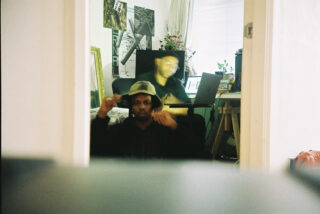
Each month we ask an artist to share three musicians they think have gone under appreciated, and three new names who they hope will avoid a similar fate
“You can not shake Manchester off of us,” says Joshua Inyang when I ask how things have changed since Space Afrika’s last album, Somewhere Decent to Live, in 2018. What he means by that is that things haven’t changed at all, even though they have.
A couple of years ago, Joshua Reid relocated to Berlin – the first electronic artist in the world to not do so for the music; he just got a good job offer. Whatever the reason, this could have been ravens leaving the tower type stuff for Space Afrika, who’ve been inseparable since they were kids, who held their collaboration together through moves to universities, who have proudly baked the sound of their city into everything they’ve ever done.
It started with ambient techno on their early releases, before Somewhere Decent to Live saw them dive down a beat-less rabbit hole, where they’re still enjoying the freedom of a post-club sound that doesn’t rely on a processed kick-drum or an instantly gratifying bassline. Part dub, part ambient, part trip-hop, part something not yet to be named, faint enough to be coming from the room next door, Space Afrika’s music is dark, beautiful, urban, comforting, unsettling and always very Manchester. Literally. When making their last album, Inyang and Reid would walk the city streets late at night with their field recorders, collecting sounds they could use in their music.
But Inyang is right – from a listener’s point of view, Reid’s move has changed nothing in the way Space Afrika sound. Last year they released extra-sparse mixtape hybtwibt? (a reaction to the murder of George Floyd, in support of Black Lives Matter) and at the end of August they’ll give us new album Honest Labour. In the absence of 4am city walks together, they’ve been finding samples from Manchester online (“of riots or discussions about housing projects”), and Reid says he’s been listening to more UK music than ever to remind him of home. The result is a record of city soundscapes ominous and seductive, featuring guest vocals from their experimental pals like never before, whispering in your ear as the high street glides by. One guest feature is included in the duo’s picks here – London-based experimentalist and choreographer Bianca Scout.
Inyang and Reid are made for a feature like this, create-diggers as they are, constantly searching for forgotten sounds and artists to inspire them. We begin with the older artist, before moving onto the new.
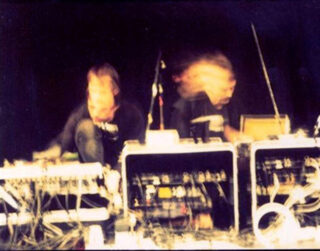
JR: I think we found Zoviet France from one evening of digging through Discogs. We pulled out a few different bands, like Coil, Psychic TV, that kind of stuff, and Zoviet France was one of them. The main reason for giving them a shout out is the raw experimentation. The influences they’ve gone for are ambient, tribal, field recordings, sample recordings. It’s amazing stuff, and it’s quite understated when you put it against Coil and some of the other bigger industrial groups. And the artwork they did, with all the different materials and ceramics and clay, it’s awesome. Really cool, DIY, Northern – love it!
SS: They really embraced the packaging side of tape culture, didn’t they? Is that something you’re interested in for Space Afrika releases too?
JI: I love that question, because one thing I want people to notice – and maybe it is – is that we drive everything to exactly how we want it. We’re super hands on. The packaging, I’m obsessive with this bit. It has to be right. At the end of the day, is you don’t know what Space Afrika is… let’s say we’re a trainer and you walk into Footlocker, if we look like a shit trainer, come on man, no ones going to grab that. But if we look like an Air Max, fresh, popping, it’s getting bought. Even if doesn’t suit you. That’s the way I look at it. If it sounds good, great, but if it looks shit I might not buy it. So the way we design it, the importance of the colours of the record, we’re into that heavily.
JR: Maybe not everyone will know this, but if you look at [our records] Above the Concrete, Primrose Avenue, Somewhere Decent to Live and even this one, all the images are actually Manchester, but they’re all in a different context. Our first cassette gives me an industrial feel like Zoviet France.
SS: Were Zoviet France a big influence on your use of field recordings?
JR: I think it would have in a more covert way. More of it is the processing of sound – that dusty element and noise elements of the sound. Not so much on this new record, but some of the earlier stuff they influenced the way we use objects in our music.
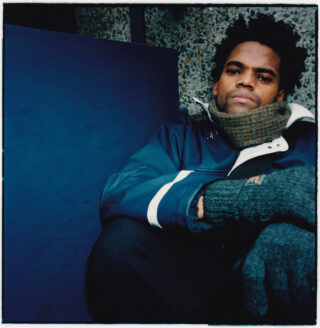
SS: I didn’t know Bows until yesterday.
JI: What a find, right? This new album, for us, had to feel like the UK – not just Manchester, but the UK. This is who we are, this is who we love – the whole Massive Attack, Tricky lineage; being able to maintain your signature regardless of age, because you’re confident in your style. So we were thinking, who’s done this who we don’t know? I was digging, digging, digging, scouring Discogs. Bows were just one of those things where it was like, ‘that’s a dope name; oh, they’re from the UK; damn, that sounds amazing.’ And then going further into the record and understanding the depth of the production, although it’s a simple records, it’s trip-hop, it’s orchestral, it’s classical, it’s ambient at parts. The artwork for Blush is beautiful. I’m picking up this record 20 years down the line and it looks like something I want to buy now. The fact that it’s still relatively unknown gives us this edge that we’ve really found something beautiful that isn’t that common.
SS: Once you listen to Bows you have to ask yourself why they weren’t bigger. It sounds so accessible, why didn’t they blow up like Portishead did?
JI: That’s exactly it. How did it get missed!?
SS: Luke Sutherland [one half of Bows] was a touring member of Mogwai for years, it turns out, which I think makes sense with some of the twinkling aspect of Bows’ music.
JI: I feel like that time in the UK captures this beautiful energy and willingness to collaborate, with people playing with different friends in bands. And this time around we took that approach, of we love that person, they’re also our friend now, and it just so happened that all the people we love are currently inspiring us and are now on our record.
JR: I’ve been waiting for this one. We’ve got a lot to say about this guy.
JI: Let’s go for two minutes each, so we don’t go too deep.
JR: Where to start? For me and Josh, the first music we were really doing together, listening to and sharing, was grime. We would write lyrics, we were involved in a local crew of producers and MCs, and in that period of time, 15 odd years ago, the group Mayhem were such bubble in Manchester, which had Shifty, Slay, Hypes, and the interesting thing with Shifty was he was a dichotomy. He was the white MC who was awesome, who grew up in the areas where the Black neighbourhoods were. One track that made him stand out was ‘Other Brother’, which was addressing themes of vulnerability, which no one else in Manchester grime was doing at the time. Unfortunately, he was involved in a car crash, but he was on the trajectory to being one of the biggest rappers in the UK.
JI: Around that time, popular culture and popular music was either on the radio, MTV or you’re watching Channel U. And Channel U was undoubtedly the biggest hub for UK-originated music – experimental, grime, drill. And the reason it was so important is because if you look at the state of UK music, drill, grime, trap is top of the charts – it’s taken these guys 20 years to be recognized. To be able to see a black man wearing a tracksuit earning a lot of money, we were running around in tracksuits being told that grime would never lead to anything positive. Although you listen to these guys’ lyrics, and they’re clearly immensely intelligent, with their literature, their English, their deliver, their cadence; and it’s always been a case of having this direct experience with the artist. You see them on the channel, you buy their mixtape, but you walk down Market Street and they’re also stood there trying to sell their records with their people, sharing this energy that is truly them. Shifty was that.
JI: Rat Heart is one of the UK’s most talented producers, hands down.
JR: I would go as far as saying Tom Boogizm is the best DJ on the planet.
JI: Honestly, you go and speak to anyone in Manchester. And I think every one of his releases has been pivotal for the city. He’s a guy who doesn’t care about fame, he doesn’t care about reviews, he doesn’t car about getting paid for a DJ show. But he fucking LOVES music. And that guy is a recluse. You’re not going to see that guy unless you’re in a music setting or you’re at his house. And I feel like there’s a lot of buzz around everyone, but it would be ridiculous for us not to put a light on this guy. And I think Rat Heart will be the thing that gives him that extra and deserved attention.
SS: As electronic musicians from Manchester, do you feel the weight of the city’s dance music heritage in a similar way to how a lot of young bands do having followed everyone from Joy Division and The Smiths to The Stone Roses and Oasis?
JI: We can give you 50 names right now of people in Manchester who are all popping and lifting the [city’s electronic] scene. Right now it feels like we’re in a period that might mimic that Oasis-type vibe. It might not have to be bands – it might be individuals, it might be a singer, it might be a producer, but I think within six months to a year, it’s going to be painful undeniable.
JR: I also think from speaking to some of the older people in Manchester that were around in the Hacienda period, they say that now is the most exciting period for music – the most super experimental. We’ve got a friend who says, yeah, I was the Hacienda – it was house music. For weeks on end. You come to clubs now and hear post-punk blended with dub, blended with drill, trip-hop. All this exciting stuff. I feel like that’s breaking down the nostalgic side of Manchester.
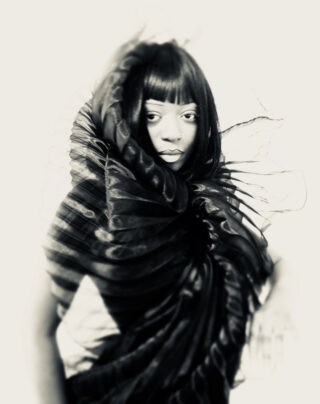 Cõvco
CõvcoJR: Cõvco is a DJ and producer based in London, specifically working in the queer Black fem scene, which is obviously underrepresented across the board. Her DJ sets are what I came across first, on NTS. They’re a really eclectic mix of all sort of different styles – some styles I hadn’t even heard of before, like primitive native styles from parts of Africa. And then she dropped a record on Bandcamp a couple of years ago called CONSCIENTEOFTHESOUL, and me and Josh were just blown away by the vulnerability of it. There’s this live element with piano chords and voice. It’s pretty minimal.
JI: It’s like a release. You’re following it down this rabbit hole, but you never really know where it’s going. The reason someone like Cõvco needs to be hightlighted is because she’s a Black female, which is already a challenging position, but she’s a Black female creating fresh and intriguing art. In London! In a completely saturated scene and city. She doesn’t seem to worry about quantity, but she’s dropping quality releases whenever she feels ready. And she works with performance in a really interesting way, with people and bodies. CONSCIENTEOFTHESOUL was performed live, and you’ve never seen anything like it.
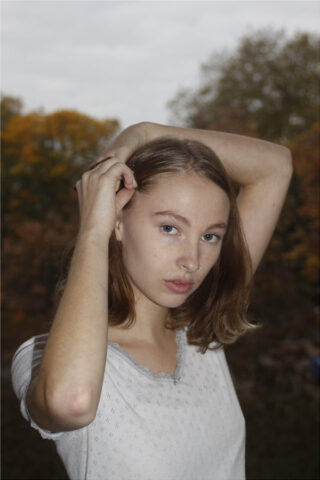 Bianca Scout
Bianca ScoutSS: Bianca Scout is also heavily influenced by dance. I think she’s a trained choreographer as well as a musician. While musically she reminds me of Dean Blunt.
JI: One hundred percent. Sometimes I ring Bianca and say, ‘right, let’s work out what the next move is, because I don’t understand how you’re not massive.’ I don’t get it. If anyone is to do significantly well, it should be her, because she lives it. Everything she does revolves around her being creative with music or dance. Her personality is the personality of rock star, or a pop star. She just bounces around. And when she puts her ideas down, the outcome is always fantastic, ethereal, beautiful, and it opens up your mind a bit. I go back to songs from 2015, and it’s like, “What the fuck!”. I’m glad we’ve got her on the album, because anyone looking for us will find her.